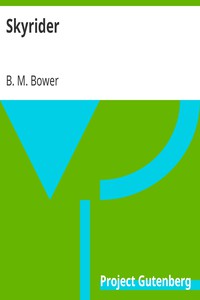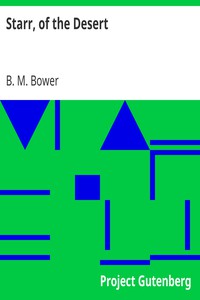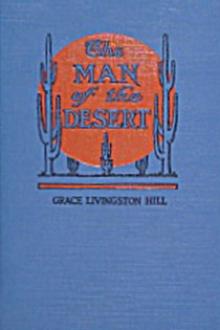The Thunder Bird, B. M. Bower [top 10 most read books in the world txt] 📗

- Author: B. M. Bower
Book online «The Thunder Bird, B. M. Bower [top 10 most read books in the world txt] 📗». Author B. M. Bower
How much would a new propeller cost? Would all the barber shops be closed when they reached town? He needed a haircut and a hot bath before he would feel fit to walk the streets. Should he take at once the position he meant to maintain, and stop at the best hotel in town, as an aviator who owned the plane he flew and had a roll of money in his pocket might be expected to do? Or should he go to some cheap rooming house and save a few dollars, and sink into obscurity among the city's strange thousands?
He remembered the headlines concerning him—front-page headlines that crowded Europe's war into second place! He had not seen anything much about himself lately, though the jailer had brought him a paper every morning. Certainly his misfortune had not been given the prominence accorded to his disappearance. If he should go to some good hotel and register as John Ivan Jewel, Tucson, Arizona, the reporters might remember the name. Probably they would, and his arrival would be announced—
What would they think, if he walked in just as he was; leather coat, aviator's cap with the ear-tabs flapping, corduroy breeches tucked into riding boots that needed a shine and the heels straightened? Would they put him out, or would they think he was so rich and famous he didn't give a darn?
He wondered what Mary V would think, if she knew that he was here in Los Angeles. Would she care whether she ever saw him again? Or could girls forget a fellow all at once? Were they still engaged, so long as she did not return his ring? He wished he knew what was the rule in cases like this. Then it struck him that Mary V could not return the ring now if she wanted to. She would not know where to send it. She might have sent it to him while he was in jail—but probably she feared that the reporters might hear about it. How much would a propeller cost, any way? There would probably be more than that broken—the Thunder Bird had turned over with quite a jolt.
No, certainly he should not spend money on high-priced hotels until he had things moving again. There would be no more money coming in until the plane was repaired—darn it, there was always that big hump in the trail; always something in the way, something to postpone his grasping at success! Now he'd have to sleep in some hot, frowsy little room for about four bits, instead of luxuriating in a suite as he would like to do.
They reached the little suburban village and the street car. Johnny had an impulse to stop there for the night and leave the city to a more propitious time, but Bland was already licking lips in anticipation of the joys of Spring Street, and made such vehement protest that Johnny yielded. If he stayed in Inglewood Bland would go on without him, and Johnny did not want that, for Bland might not come back. And whatever his mental and moral shortcomings, Bland was somebody whom Johnny knew; if not a friend, yet a familiar personality in a city filled with strangers.
Perhaps it was the night that veiled the city's big human workaday side and showed only the cold, blue-white residence streets palm-shaded and remote, and the inhospitable closed stores and shops of the business district, that gave Johnny a lost, lonesome feeling of utter homelessness. For the matter of that, Johnny could not remember when he was not homeless—but he did not often feel depressed by the fact. He followed Bland down the car steps at Fifth Street, walked with him past a delicatessen store whence apartment dwellers were trickling, their hands full of small paper bags and packages. They looked pale and sickly and harassed to Johnny, to whom desert-browned faces were a standard by which he measured all others.
A barber shop reminded him of grime and untrimmed hair, and he halted so abruptly that Bland forged several paces ahead before he missed him. He turned back grumbling, just as Johnny went in at the door, and followed grudgingly. He had wanted a glass of beer first of all, but yielded the point and took his shave resignedly.
Johnny spent a full hour in that shop, and when he emerged he was worth the second glance he got from the girls hurrying homeward. Tubbed, shaven, trimmed, a fresh shine on boots that still showed the marks of spurs worn from dawn to dark when those boots were new, he towered above Bland Halliday, who looked dingier and more down-at-heel than ever by contrast. It would take more than shaven jowls to make a gentleman of Bland.
They went on to Broadway, crossed it precariously, and reached the pavement by what Johnny considered a hair's-breadth of safety as a big car slid past his heels. They passed lighted plate-glass windows wherein silver and gold gleamed richly. Then Bland unwittingly pushed Johnny Jewel from the edge of obscurity into the bright light of notoriety again.
Bland said, "I know a joint where we can git a good room for fifty cents—and no questions asked, bo."
They happened at that moment to be nearing the immaculate white-gloved doorman who stands ward over the entrance to the Alexandria. Johnny looked at him, saw what exclusive hostelry was named upon his cap band, and stopped. "You can go to your joint where they don't ask questions," he said somewhat loftily to Bland. "I'll stop here where they don't have to."
Bland gasped, but Johnny was already turning in past the immaculate white-gloved one who bowed as Johnny brushed him by. Bland had only time enough to mutter, "I'll wait here till you register," before Johnny disappeared into the subdued elegance where Bland would not venture. "Till they throw yuh out, you boob," Bland amended his parting sentence. "Stoppin' at the Alexandria—hnm!"
Johnny, secure in his fresh cleanness and his ignorance of the traditions of the place, strode through the onyx-pillared lobby peopled with well-fed, modish human beings who conversed in modulated voices or bustled in and out, engrossed with affairs which might or might not be of national importance. At the desk a perfectly groomed, worldly wise aristocrat proffered a pen well inked and gave Johnny what Bland would have termed the double O.
Before he had finished pressing blotter upon "John Ivan Jewel, Tucson, Arizona", his brain had registered certain details and his smile had attained a certain quality of deference.
"We are glad to have you with us, Mr. Jewel. Ah—a room and bath, say on the sixth floor? Ah—did you have a good flight, Mr. Jewel?"
Oh, the adaptability of American youth! "Made it in seven hours continuous flight," Johnny informed him carelessly. "Nothing to it. Yes, the sixth floor will be all right. Didn't bring any baggage—didn't want to load the plane down."
And that clerk, to whom baggageless guests are ever objects of suspicion, smiled understandingly and called his favorite boy, and when Johnny's back was turned, immediately whispered the news that that Arizona flyer who had been so much in the public eye lately, was a guest of the hotel, having flown over in five hours.
CHAPTER FOURTEEN FATE MEETS JOHNNY SMILINGJohnny inspected his room and bath on the sixth floor and straightway began to worry about the bill. The shaded reading lamp by the bed impressed him mightily, as did the smoking set on its own little mahogany stand, and the coat-hangers in the closet. Johnny was accustomed to stopping in hotels where the furnishings were all but nailed down, and the little conveniences were conspicuously absent. This, he decided, was a regular place; a home for millionaires. He doubted very much whether the Thunder Bird was worth the furniture in this one room, and wondered at his own temerity in making free with it. To brace his courage he must untie the roll of money Bland had given him in Tucson and count the bank notes twice.
"By golly, I can stand one night here, any way," he reassured himself finally, and took a long breath.
Just then a bell boy tapped discreetly on the door, and when Johnny opened it he slipped in with a pitcher of ice water, which he carried to a table with the air of a loyal henchman serving his king, which means that he was thinking of tips. In the exuberance of his fresh sensation of affluence and his gratitude for the service, Johnny pulled off a five-dollar bill and gave it to the boy. The bell boy said, "Thank you, sir," and added breathlessly, "Gee, I wish I was an aviator, Mr. Jewel!"
Sir and Mister all in one breath, and to be called an aviator besides had a perceptible effect upon Johnny. He swaggered across the room that had a moment ago awed him to the point of wanting to walk on his toes. Of course he was an aviator! Hadn't he been flying in his own plane? What more did it take, for gosh sake? A pilot's license was a mere detail, alongside the night he had made that day. He should say he was an aviator!
The 'phone tinkled. A man from the Times wanted to talk with him, it seemed. Johnny gruffly told him over the house 'phone that he didn't care to be interviewed. "You boys get too fresh," he censured. "You don't stick to facts. You're going to get in trouble if you don't let up on me. I hate this publicity stuff, anyway. I wish you'd go off somewhere and die quietly and leave me alone."
"Well, just let me come up and explain," the reporter urged. "All I want is a story of your flight across country. You're mistaken if you think I'm guilty of—"
"Oh, well, if that's all you want. But I'm just about off reporters for life. You'll have to do some apologizing, believe me!"
Johnny was sprawled on the nice, white bed, with his boot heels cocked up on the expensive mahogany footboard. He had the two big, puffy pillows wadded under his head and the reading lamp lighted and throwing a rosy shadow on his tanned countenance. The smoking set was pulled close and he was reaching for a match when the reporter knocked.
"Come in," he called boredly, and fanned the smoke from before his face that he might look upon this unwelcome visitor who was going to apologize for the sins of his colleagues in Arizona.
The reporter, once he was inside, did not look apologetic, nor did he resemble a reporter, as Johnny knew them. He was a slim young man, tall enough to wear his clothes like the Apollos you see pictured in tailors' advertisements. Indeed, he much resembled those young men. He wore light gray, with the coat buttoned at the bottom and loose over his manly chest. He also wore a gray hat tilted over one temple in the approved style for illustrated catalogues. He had gray gloves crumpled in one hand and a cane in the other, and he stood with his immaculately shod feet slightly apart, gently swung the cane, and regarded Johnny with a faint smile of extreme boredom.
Johnny bore the scrutiny in silence, stifling the impulse to rise and offer Apollo a chair. Instead, he turned lazily and knocked the ash collar off his cigarette, and afterward thumped the top pillow before he resettled himself.
"Won't cost anything to sit down," he observed amiably. "Well, where's that apology?"
The slim young man laughed to himself, deposited his cane and gloves on a chair, moved his feet slightly farther apart and produced a small pad. "For the sins I may commit, I humbly apologize. Whatever it was your sagebrush scribes perpetrated I didn't write it, therefore we should not quarrel. A few details on your trip to-day will be of interest, Mr. Jewel."
Johnny





Comments (0)